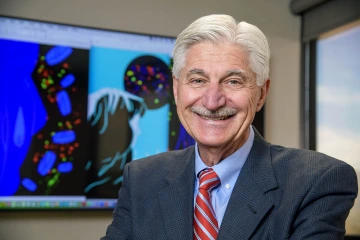New UArizona Health Sciences Center Will Expand Research Opportunities to Address Addiction
A $6.6 million grant from the National Institutes of Health will help build the Center of Excellence for Addiction Studies to advance addiction research.

For the first time, the Centers for Disease Control and Prevention reported a 12-month estimate of more than 100,000 deaths from opioid overdoses in the U.S. Collaborative efforts that will be fostered through the new Center of Excellence for Addiction Studies will be vital to help find solutions to end the opioid epidemic.
Researchers at the University of Arizona Health Sciences were recently awarded a $6.6 million grant by the National Institutes of Health to develop the Center of Excellence in Addiction Studies, designed to improve addiction research with a goal of developing therapies that can stem the opioid epidemic and impact other substance abuse disorders.

Todd Vanderah, PhD, is a professor and head of the College of Medicine – Tucson Department of Pharmacology and interim director of the UArizona Health Sciences Comprehensive Pain and Addiction Center.
Funded by the National Institute on Drug Abuse, a division of the NIH, the Center of Excellence for Addiction Studies, or CEAS, will provide key services to facilitate national collaborations and develop projects that will lead to new addiction research. Todd Vanderah, PhD, and Frank Porreca, PhD, interim director and interim associate research director, respectively, of the UArizona Health Sciences Comprehensive Pain and Addiction Center, are leading the development of the CEAS.
“We want to create new approaches to treat addiction,” said Dr. Porreca, a professor in the Department of Pharmacology at the UArizona College of Medicine – Tucson. “We have recognized that addiction results from changes in the brain, and in that way, it should be studied and treated like other neurological disorders. There is a remarkable overlap between the influence of drugs of abuse and chronic pain on brain circuitry. We are uniquely positioned to lead this effort since we have a large group of researchers and facilities that specialize in both areas of research.”

Frank Porreca, PhD, is a professor of pharmacology in the College of Medicine – Tucson.
“When we bring these three components together – measuring transmitters and where they act, measuring cell-specific manipulations in brain circuits that can produce and influence behavior, and then measuring the behavior itself – it becomes powerful in putting together projects that can be designed to answer questions relevant to drug addiction and relapse,” Dr. Porreca said.
Resources offered through the CEAS will be available not only to UArizona researchers, but also to scientists throughout the Southwest, including through existing collaborations at Arizona State University, Northern Arizona University, the University of New Mexico and the Texas Tech University Health Sciences Center. Researchers at other institutions can utilize the novel models and advanced testing capabilities at the CEAS to develop new collaborative studies into mechanisms and molecular targets relevant to addiction and relapse and gather the preliminary data necessary to pursue additional addiction-related funding.
“The opioid epidemic affects millions of people each year. With the University of Arizona’s strong history of collaboration we will be able to help tackle the challenges of this devastating national health crisis,” said University of Arizona President Robert C. Robbins, MD. “Through the Center of Excellence in Addiction Studies, the top pain and addiction experts in the region will work together to advance the field of addiction science. I am very glad to see the University of Arizona Health Sciences leading this important effort.”
“The center will serve as a nexus for groups working on addiction research,” said Dr. Vanderah, a professor and chair of the Department of Pharmacology and a BIO5 Institute member. “It’s not just us; it's serving a whole community of individuals.”
Dr. Vanderah added that the CEAS also will promote increased diversity in addiction research by recruiting and training faculty and students from underrepresented populations in neuroscience and addiction science.
Additionally, a pilot research project will support exploratory projects to create new technology or approaches that could extend the capacity to do research in addiction sciences.
“We've already heard from some individuals who want to start collaborative projects,” Dr. Porreca said. “We'd like to see some of the projects result in cutting-edge publications to advance knowledge and to provide data for grant applications to the National Institutes of Health. In this way, we will bring researchers who are studying something else into the addiction sciences field. That's the real desired outcome, is to bring a lot of new, creative minds to solve the problems that are associated with addiction as a brain disorder.”
This work is supported by the National Institute on Drug Abuse, a division of the National Institutes of Health (1P30DA051355-01A1).
Contact
Stacy Pigott
520-539-4152
spigott@arizona.edu

